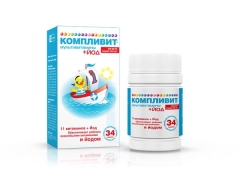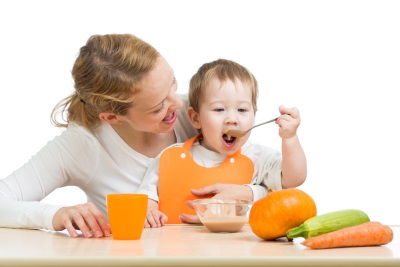Vitamins with iodine for children
In the children's body iodine plays a significant role. First of all, this element is important for the functioning of the thyroid gland and the formation of its hormones responsible for metabolic processes. Also daily intake is required for the functioning of other organ systems of the child.
Childhood Needs
Since iodine does not form in the child’s body, it should be taken daily by the child’s body with food or as part of supplements. Depending on the age, the child requires such amount of iodine every day:
|
Up to 2 years |
50 mcg |
|
In 2-6 years |
90 mcg |
|
At 7-12 years old |
120 mcg |
|
Over 12 years old |
150 mcg |
Symptoms of shortage
Kids with iodine deficiency often get sick, become lethargic and nervous. The child will experience weakness, headaches, complaints of discomfort in the throat (a feeling of coma and itching), difficulty in swallowing. His physical activity decreases, a dry cough may appear.
Long-term lack of iodine in food can affect the mental development of the child and the state of the thyroid gland. The result of a deficiency is mental retardation, goiter and hypothyroidism. The thyroid gland increases in size, nodes can form in it, and the level of hormones decreases.

Iodine products
Most often iodine deficiency is associated with unbalanced nutrition of children, so the task of parents should be to control the diet of their son or daughter. In the child's menu should be present such products:
- Sea Kale
- Hake, salmon, haddock, flounder and other fish.
- Squids and shrimp.
- Whole milk, hard cheese and dairy products.
- Chicken eggs.
- Dishes from pork, beef and other meats.
- Broccoli, greens, peas, beans and other vegetables.
- Persimmon, melon, grapes, banana, apples, strawberries, citrus and other fruits or berries.
- Buckwheat, millet, oatmeal, bread from rye and wheat flour.
- Champignon.
It is important to remember that heat treatment reduces the amount of iodine in the product, so it should be gentle. The best option is called steaming. Of great importance in the prevention of the shortage of this element is iodized salt.
Who needs vitamins with iodine
Supplements including iodine are recommended for children:
- Living in an area where this microelement is small in soil and water.
- With a genetic predisposition to thyroid disease.
- With diseases of the digestive tract, impairing the absorption of nutrients from food.
Drug review
To supplement the children's diet with iodine, apply supplements based on potassium iodide. Its dosage for the prevention of goiter is 50-100 mcg of iodine at the age of 12 years and 100-200 mcg of iodine for children over 12 years old. The duration of use should be agreed with the doctor, as in some cases, prevention is carried out only a few months, and sometimes these supplements are required to take a lifetime.
Drugs in which iodine is the main component are:
- Yodomarin 100 or 200.
- Jodbalans.
- Iodine Vitrum for children.
- Iodide 100 or 200.
- Potassium iodide.
- Yodostin
- Microiodide
Most of these drugs produced in tablets and used from birth - for the smallest tablet is dissolved in a small amount of water.
For the prevention of iodine deficiency in childhood, iodine-containing vitamin complexes are also often used.Iodine in them is often represented by potassium iodide or sodium iodide. Here are the most popular multivitamins:
Name of the complex | Iodine content |
Whit Multi + | 20 mcg in 1 pastille for a child over 3 years old |
Alphabet Our baby | 35 mcg in 1 sachet for children 1.5-3 years |
Alphabet Kindergarten | 50 mcg in 1 orange tablet for a 3-7 year old child |
Alphabet Schoolboy | 78 mcg in 1 orange tablet for a 7-14 year old child |
Alphabet Teen | 150 mcg in 1 orange tablet, calculated on the age of 14-18 years |
Vitrum Baby | 80 mcg in 1 fruit tablet for a child 3-5 years old |
Vitrum Kids | 150 mcg in 1 strawberry tablet for a 4-7 year old child |
Vitrum Junior | 150 mcg in 1 fruit tablet for children 7-14 years |
Vitrum Teen | 150 mcg in 1 chocolate tablet for a teenager 14-18 years old |
Jungle kids | 70 mcg in 5 ml of syrup for children 1-6 years |
Jungle with minerals | 150 mcg in 1 chewable tablet for children over six years old |
Compl Active | 100 mcg in 1 tablet in the shell for a 7-12 year old child |
Comp active Chewable | 50 mcg in 1 chewable tablet for children 3-10 years |
Complite Multivitamins + Iodine | 75 mcg in 5 ml suspension for a child over three years old |
Multi-tabs Kid | 70 mcg in 1 tablet for a child 1-4 years |
Multi-tabs Kid Calcium + | 70 mcg in 1 tablet for babies 2-7 years |
Multi-tabs Junior | 150 mcg in 1 tablet for children 4-11 years |
Multi-tabs Teen | 130 mcg in 1 tablet |
Multi-tabs Immuno Kids | 80 mcg in 1 tablet for a child 7-14 years old |
Pikovit Junik 3+ | 16 mcg in 2 chewable tablets |
Pikovit Plus 4+ | 40 mcg in 1 banana tablet |
Solgar Kangavites Multivitamins and Minerals | 22.5 mcg in 1 tablet for children from 2 years |
Solgar U-Cubes Chewable Multivitamins and Minerals | 30 mcg in 2 lozenges for a child over 2 years old |
Supradin Kids Junior | 60 mcg in 1 tablet for children from 5 years |
In the video below, you can see what Dr. Komarovsky says about the benefits of iodine for the children's body, and how iodine deficiency can affect the development of the child.













